Book Review – Beastly Fury: The Strange Birth of British Football by Richard Sanders
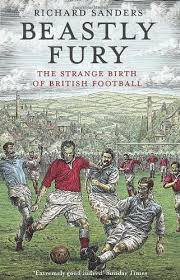 What a strange main title it seems for a book about football, until you read what it is referring to (page 78)! The subtitled part takes rather longer to develop, naturally, since that is the central theme and Sanders does take a while to get into his stride, mainly because he is detailing the growth of football in the British public schools.
What a strange main title it seems for a book about football, until you read what it is referring to (page 78)! The subtitled part takes rather longer to develop, naturally, since that is the central theme and Sanders does take a while to get into his stride, mainly because he is detailing the growth of football in the British public schools.
The narrative then becomes very good indeed as Sanders builds the argument that football was actually rescued from the public schools and finally appropriated by the working man. Only then was it in a position to become the national game, although the public-school educated elite continued to hold back the game in any way they could, mostly through the shameful favouring of so-called amateurs (i.e. them, the ruling class) over the unspeakable professionals (i.e. us, the rest).
Although the book is centred on football, it is arguing a larger case – the unfairness of the class structure – and, although it is clear where the author’s sympathies lie, he does it well and with a fair degree of objectivity.
Eventually, the whole title is fully explained and, as such, makes the wider claim that the men from public schools, once they’d stopped playing with themselves and each other, went on to spawn the child that is modern football. In this strange, Freudian reading, the mother, then is the working class.
It is a good book though, full of fascinating detail and it is scrupulously researched. Sanders has expertly synthesised a wide range of source material and put it into a narrative that only loses its authority and cogency on the odd occasions when it wanders off football into general theorising about society.
It is not a light read but is packed with interest and broken into logical chapters, each introduced by an apt quotation and with thoughtful and sometimes thought-provoking headings such as ‘A Most Unfeminine Exhibition’. Sanders cares about the humanity of the people involved, too. This comes across most clearly in his profile of Billy Meredith, shown in many guises and over many years.
Sanders is particularly adept at charting the conflicts and power struggles that shaped the game we now know; the public school ‘amateur’ versus the working class professional, the rise and rise of the F.A., the triumph of the club directors over player power, the difficulties faced by women who wanted to take up the sport in a hostile Victorian era. His reasoning is persuasive since, after all, a football match is a form of conflict.
His final chapter, ‘Football at War’, is the most impressive one, neatly summarising what has gone before and focusing on an extract from J.B. Priestley’s The Good Companions which so neatly encapsulates why football became the national game for the working man.
I suppose you could read the final chapter and skip all the rest but, if you did, you would miss so much.
Graeme Garvey
 When England manager Roy Hodgson recently suggested that he would be monitoring the progress of Manchester United’s Belgian youngster Adnan Januzaj, the issue of international player eligibility was once more in the news.
When England manager Roy Hodgson recently suggested that he would be monitoring the progress of Manchester United’s Belgian youngster Adnan Januzaj, the issue of international player eligibility was once more in the news.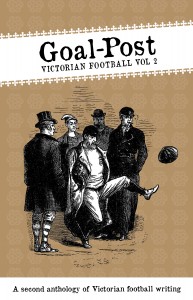 Back in September 2012, Paul Brown published his
Back in September 2012, Paul Brown published his 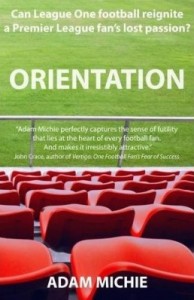 In the Prologue to Orientation, Adam Michie recalls being taken by his father to Upton Park in February 1989, in a pre-Premier League, pre-Sky Sports, First Division encounter between West Ham United and Queens Park Rangers that ended 0-0. Football in England at that time was about to hit the buffers with hooliganism at its height and the tragedy of Hillsborough months away. The subsequent recommendations of the Taylor Report and the birth of the Premier League changed the sport in this country irrevocably. Michie continued with visits to Upton Park with his grandad, but yearned for the experience of going to games, “…with people I knew, my friends, sharing the experience…” He took up supporting Spurs in 1991 so that he could go to games at White Hart Lane with his schoolboy mates. However, as ticket prices rocketed and his friends took up supporting some of the other ‘big’ clubs in London and further afield, Michie drifted away from attending games and became one of the games “…sofa supporters…”
In the Prologue to Orientation, Adam Michie recalls being taken by his father to Upton Park in February 1989, in a pre-Premier League, pre-Sky Sports, First Division encounter between West Ham United and Queens Park Rangers that ended 0-0. Football in England at that time was about to hit the buffers with hooliganism at its height and the tragedy of Hillsborough months away. The subsequent recommendations of the Taylor Report and the birth of the Premier League changed the sport in this country irrevocably. Michie continued with visits to Upton Park with his grandad, but yearned for the experience of going to games, “…with people I knew, my friends, sharing the experience…” He took up supporting Spurs in 1991 so that he could go to games at White Hart Lane with his schoolboy mates. However, as ticket prices rocketed and his friends took up supporting some of the other ‘big’ clubs in London and further afield, Michie drifted away from attending games and became one of the games “…sofa supporters…” Some reviews are easier to do than others in that you know exactly how you feel about a book and therefore can easily articulate that. The more difficult ones are those where you are still, even a few days after finishing the book, unsure as to the impression left by the pages you have just digested.
Some reviews are easier to do than others in that you know exactly how you feel about a book and therefore can easily articulate that. The more difficult ones are those where you are still, even a few days after finishing the book, unsure as to the impression left by the pages you have just digested.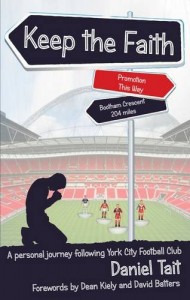 “Keep the Faith” is the personal reflections of Dan Tait in supporting his team over the last twenty years. His story starts back in 1992, when the nine year old York-born Tait ignored the lure of the shiny new Premier League and the ‘big’ clubs, to support his local team York City. It was to prove a fantastic first season following The Minstermen, as the team gained promotion from the ‘old’ Fourth Division via a Play-off win at Wembley against Crewe. Just as the book begins on a positive note, so does it end in this manner, with York retaining their League status on the last day of the 2012/13 season.
“Keep the Faith” is the personal reflections of Dan Tait in supporting his team over the last twenty years. His story starts back in 1992, when the nine year old York-born Tait ignored the lure of the shiny new Premier League and the ‘big’ clubs, to support his local team York City. It was to prove a fantastic first season following The Minstermen, as the team gained promotion from the ‘old’ Fourth Division via a Play-off win at Wembley against Crewe. Just as the book begins on a positive note, so does it end in this manner, with York retaining their League status on the last day of the 2012/13 season.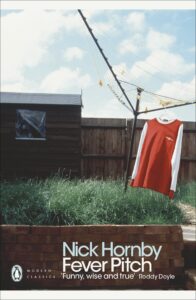 With the end of the 1991/92 season, the format of football in England shifted seismically; Leeds United were the last Football League Division One Champions and in 1992/93 the FA Premier League was born, to change forever the soccer landscape in this country. 1992 also saw the release of Fever Pitch by Nick Hornby, which transformed the way football literature was viewed to become a seminal work in sports writing.
With the end of the 1991/92 season, the format of football in England shifted seismically; Leeds United were the last Football League Division One Champions and in 1992/93 the FA Premier League was born, to change forever the soccer landscape in this country. 1992 also saw the release of Fever Pitch by Nick Hornby, which transformed the way football literature was viewed to become a seminal work in sports writing.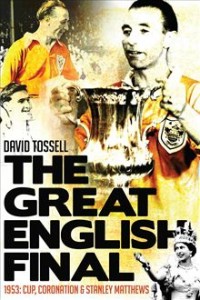 David Tossell’s book about the 1953 FA Cup Final when Stanley Matthews’ Blackpool beat Bolton 4-3 makes a grandiose but puzzling claim. It says that the “…legendary game continues to occupy a prominent place in English football legend…” (sic) because it has, “…come to represent a Golden Age…” But it doesn’t even leave things at that. Not content with such a mighty claim about the game’s footballing pedigree, it makes wider claims for the match that cannot possibly be substantiated. The raw material for a really good story about football is there all right, but he nearly messes it up by trying to bring in too many different themes. Happily, he is saved by the fact that, finally, the Final delivered.
David Tossell’s book about the 1953 FA Cup Final when Stanley Matthews’ Blackpool beat Bolton 4-3 makes a grandiose but puzzling claim. It says that the “…legendary game continues to occupy a prominent place in English football legend…” (sic) because it has, “…come to represent a Golden Age…” But it doesn’t even leave things at that. Not content with such a mighty claim about the game’s footballing pedigree, it makes wider claims for the match that cannot possibly be substantiated. The raw material for a really good story about football is there all right, but he nearly messes it up by trying to bring in too many different themes. Happily, he is saved by the fact that, finally, the Final delivered.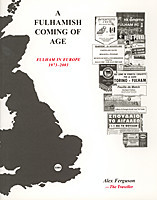 Alex Ferguson started watching Fulham in the 1950s and did so through the many ‘ups and downs’ the club endured, until his untimely death in 2006. Alex became one of the most recognised, if not the most renowned fan of the club, following the ‘Lilywhites’ wherever and whoever they played. No matter if it was the first-team, the reserves, the youth team, Fulham Ladies – league, cup, testimonial, friendly; Alex was there. He also watched England at all levels with the same enthusiasm and fanaticism and his journeys with both club and country earned him the moniker of ‘The Traveller’.
Alex Ferguson started watching Fulham in the 1950s and did so through the many ‘ups and downs’ the club endured, until his untimely death in 2006. Alex became one of the most recognised, if not the most renowned fan of the club, following the ‘Lilywhites’ wherever and whoever they played. No matter if it was the first-team, the reserves, the youth team, Fulham Ladies – league, cup, testimonial, friendly; Alex was there. He also watched England at all levels with the same enthusiasm and fanaticism and his journeys with both club and country earned him the moniker of ‘The Traveller’.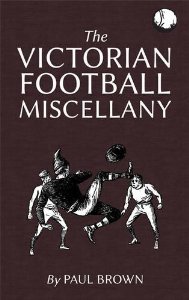 Back in 2012, Paul Brown edited an anthology of Victorian football writing, titled
Back in 2012, Paul Brown edited an anthology of Victorian football writing, titled